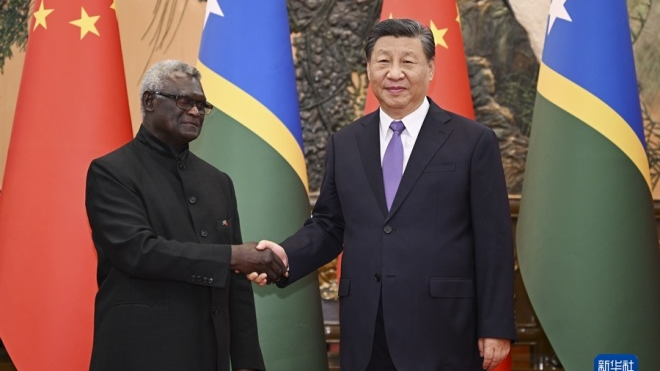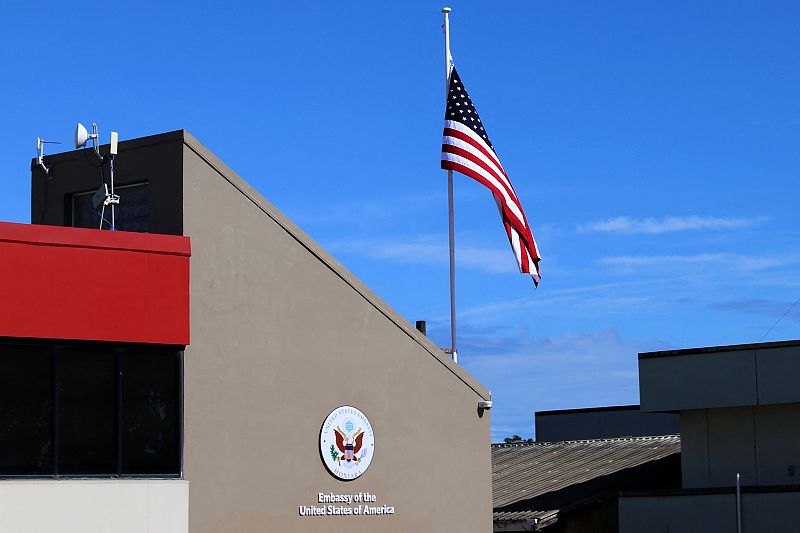
Chinese President Xi Jinping meets with visiting Prime Minister of the Solomon Islands Manasseh Sogavare in Beijing, capital of China, July 10, 2023. /Xinhua
Chinese President Xi Jinping meets with visiting Prime Minister of the Solomon Islands Manasseh Sogavare in Beijing, capital of China, July 10, 2023. /Xinhua
Editor's note: Daryl Guppy, a special commentator on current affairs for CGTN, is an international financial technical analysis expert. He has provided weekly Shanghai Index analysis for mainland Chinese media for more than a decade. Guppy appears regularly on CNBC Asia and is known as "The Chart Man." He is a former national board member of the Australia China Business Council. The article reflects the author's opinions and not necessarily those of CGTN.
Solomon Islands Prime Minister Manasseh Sogavare's Beijing visit has a focus on the way China can assist with their development needs. "We want to remain neutral because it is not in the interest of our people and country to take sides and align ourselves with interests that are not our interests. Our national interest is development."
Sogavare said his country "has a lot to learn from China's development experience." China is leading the way in non-ideological engagement.
This assertion of sovereign independence is evidence of freedom to choose. The United States and Australia seem to think that neutral independence means the freedom to choose only America and the West. Prime Minster Sogavare's visit to China is deeply concerning to the U.S. and Australia because they believe the Pacific owes them some form of obligation.
The U.S. and the French ensured relief from Japanese occupation after World War II, but they did not bring true independence to the region. The French rapidly restored colonial control. The U.S. was quick to bully the liberated islands back into its imperial fold as trusts or protectorates. Any sliver of independence was limited by abysmal levels of funding support, compensation and assistance with cleaning up the detritus of war.
Even today, unexploded World War II munitions from both the Japanese and allies continue to injure and kill people in the Solomon Islands.
In appealing to this sense of obligation, America is really demanding that the Solomons and other Pacific Islands forget Washington's own history in the region. To be sure, America is happy to concentrate on its role in using the islands to push back the Japanese in World War II. They are keen to suggest that the pushback had the interests of the Pacific Islanders at heart, but their post-war abuse of the Pacific tells a different story.

The national flag hangs above the U.S. embassy building in Honiara, Solomon Islands, February 2, 2023. /CFP
The national flag hangs above the U.S. embassy building in Honiara, Solomon Islands, February 2, 2023. /CFP
That story includes 105 atomic weapon tests, the destruction of islands and the forced relocation of entire island populations. It includes the dumping of hazardous chemicals and weapons in once-pristine Pacific islands waters. The French story includes more than 170 nuclear tests, ending in 1995.
From Australia's perspective, these islands were once the hunting grounds for slaves kidnapped from the beaches and villages to work on the cane fields of Queensland. Times have changed, and in the post-war years, Australia has been a generous donor to the region. Today the trade in Pacific Island labor continues and remains subject to unacceptable levels of wage exploitation.
Despite pleas from the Pacific Islands, Australia stopped its shortwave radio service in 2017. The service was essential to the Pacific islands for both news and typhoon weather warnings. Pacific Islanders noted the way their pleas were ignored. When China moved to restore the service, Australia complained and this response was again noted by the region.
Australia blocked the sale of cell phone service provider Digicel to Huawei, not because Australia's Telstra offered a better service, but because Australia wanted to block China.
The South Pacific was, and again is, a scene of operations for the Western powers including Australia. Some of these operations deliver benefits, but this is often just a collateral impact rather than the primary purpose of engagement. China's assistance comes without ideological demands and is consistent with the objectives of the Global Development Initiative proposed by Chinese President Xi Jinping.
Sogavare is not alone in understanding the fickle relationships that underpin the precarious nature of development and survival in the Pacific. Like other leaders, he saw tears from the Tongan Prime Minister when the Australian Prime Minister Scott Morrison ignored pleas on climate change.
Sogavare's visit is leading the way in managing the balance of renewed interest in the region with China's support.
The region is again important as the Western powers seek to counter China's influence and assistance offered to the region. Unlike World War II, the leaders of the Pacific are now more sophisticated and adept in using their new-found strategic importance to maximize the benefits to their people and their islands. This neutrality gives them a freedom of action that was denied to them previously.
This independence of decision-making hands victory to the people of the Pacific because it gives them access to real levels of assistance that have been lacking for the previous decades.
When it comes down to the essentials, the Western players in the Pacific are uncomfortable with the exercise of neutral independence by Prime Minister Sogavare. They worry such independent tendencies may spread more widely through the Pacific. Their foremost concern is the impact on their own influence and not on the empowerment of the people of the Pacific.
The Pacific Islands want development assistance on their terms and Sogavare's visit to China and China's response are showing how it is done by "remaining neutral because it is not in the interest of our people and country to take sides."
(If you want to contribute and have specific expertise, please contact us at opinions@cgtn.com. Follow @thouse_opinions on Twitter to discover the latest commentaries on CGTN Opinion Section.)